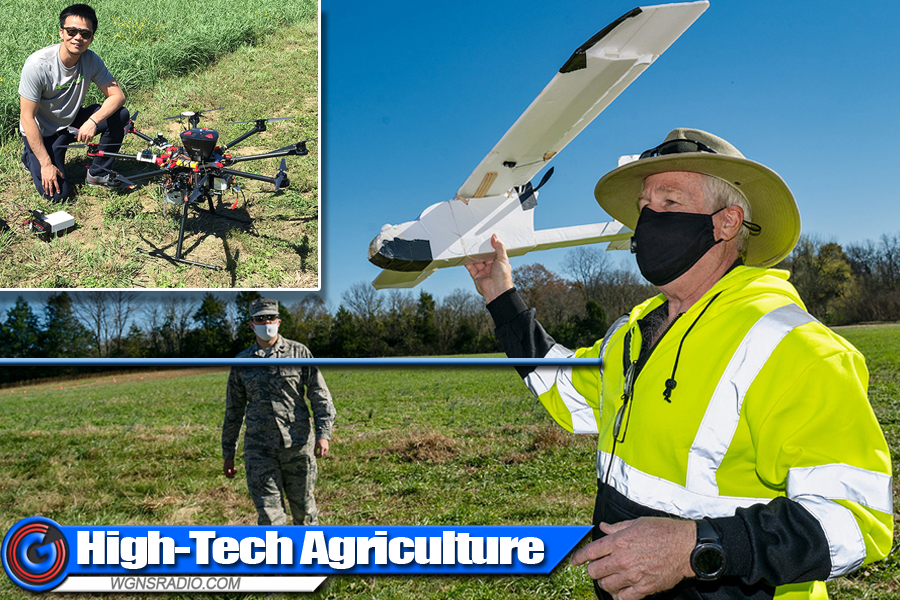MURFREESBORO, Tenn. — MTSU’s School of Agriculture seeks to develop the first Digital Agriculture Center in Tennessee after landing three-year, nearly $750,000 grant from the U.S. Department of Agriculture and National Institute of Food and Agriculture.
It will feature a series of linked student/non-formal educator-centered projects as well as community outreach events that will ultimately forge a strong Digital Agriculture/Data Science education program focused on youth across Tennessee.
The USDA recently announced the Food and Agricultural Non-formal Education awards. Non-formal education is that occurring outside the formal school system — after-school educators, scout leaders, 4-H youth development agents, FFA advisers, parent groups and others.
School of Agriculture associate professor Song Cui is the project leader, with immense support.
“Dr. Cui’s USDA/NIFA grant represents a truly interdisciplinary effort that combines several of MTSU’s key strengths: agriculture, unmanned aircraft systems, science education and data science into a project that will have important and lasting impacts across the state for years to come,” said Greg Van Patten, College of Basic and Applied Sciences interim dean.
The project aims at developing the Tennessee Digital Agriculture Center, which will provide a high-quality set of non-formal education experiences and projects that involve non-formal educators and students in the state. The grant, announced by the USDA Dec. 9, runs 2022-24.
“The team he has assembled has recognized leaders from each of these areas, and this project addresses one of our college’s key goals, which is to educate future generations of Tennesseans across science disciplines,” Van Patten added. “Agriculture enables us to feed our population; as such, it is a critical discipline for us to champion and to pass on to future generations.”
Scroll down for more on this story...
Continued...
MTSU partners banding together
Rushton, who is interim co-director for Strategic Growth in the Office of Research and Sponsored Programs, said “it’s exciting to see how so many different partners Song and his team have assembled from MTSU that are coming together to support STEM (science, technology, engineering and math) education for our state’s youth. TSEC is honored to play a part in supporting its success over the coming years.”
Otter said his group “is excited to collaborate on this interdisciplinary grant. A major mission of the Data Science Institute is helping to advance environmental science through the use of data science, and this project is in perfect alignment with that mission.”
Cui (pronounced CHOY) said “the entire team is very excited about the opportunity, and we started laying out the groundwork back in early November.”
Cui expects the impact will extend to graduate students and faculty members at the postsecondary level. He said student veteran Robert Conner, who has an agriculture background and an interest in data science, will be one of two master’s students involved from the start. The second will be from the Mathematics and Science Education program, whose director, Jennifer Kaplan is providing support.
MTSU researchers are making waves with USDA grants. Janie Becker, award management specialist in the Office of Research and Sponsored Programs, reports 23 active USDA grants with a combined award value of more than $5.5 million.
Immediate plans
Each year, two diverse groups of 15 high school students — one-third from underrepresented groups — and 20 non-formal educators will be recruited to the Digital Agriculture Summer Camp and Digital Agriculture Academy at MTSU.
The proposed training program will integrate a structured schedule of online learning contents, hands-on learning activities, as well as field visits and demonstrations on real-world digital agricultural projects.
For the summer camp, MTSU will recruit and engage high school students in problem and team-based learning on unmanned aircraft systems and data science application in agriculture. Organizers will develop supervised ag experience training components in alliance with the National Association of Supervisors of Agricultural Education, collaboratively build training elements for obtaining a UAS pilot license and teach students about basic principles of data science and career opportunities in digital agriculture.
For the academy, organizers will develop training programs for non-formal educators, provide interaction opportunities where scientists can share their work with non-formal educators and students and support non-formal educators to set and fulfill goals toward professional growth and advancement.
Cui said they will “link numerous ongoing agriculture, STEM and data science events targeted at youth to this proposed project, and ultimately cultivate a strong non-formal education community of digital agriculture in Tennessee.”
A new grant program
Cui said the USDA-NIFA Food and Agriculture Non-Formal Education program is a new grant initiative. MTSU is one of only 11 institutions in the nation awarded this grant. The other 10 are land-grant schools or nonprofit organizations.
“Worth mentioning: Ours is a sole-institution award, meaning there is only one institute (MTSU) on our proposal,” Cui said. “This is very rare for a large grant project, as most of them favor multi-institutional collaboration.”
Cui points out the “collaborative nature of this project involves principal investigator and co-PI members across two departments (agriculture and aerospace) and two centers/institutes (data science and Tennessee STEM Education Center) campuswide.”
Cui praised the entire team for their ongoing contributions, but especially Chaney, who has a knack for writing and landing USDA grants. “This award would not happen without his contribution,” Cui said.






